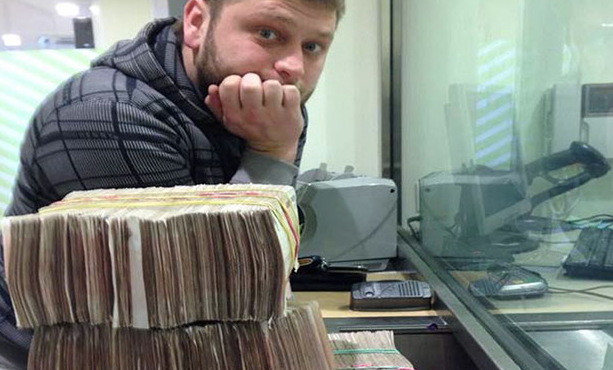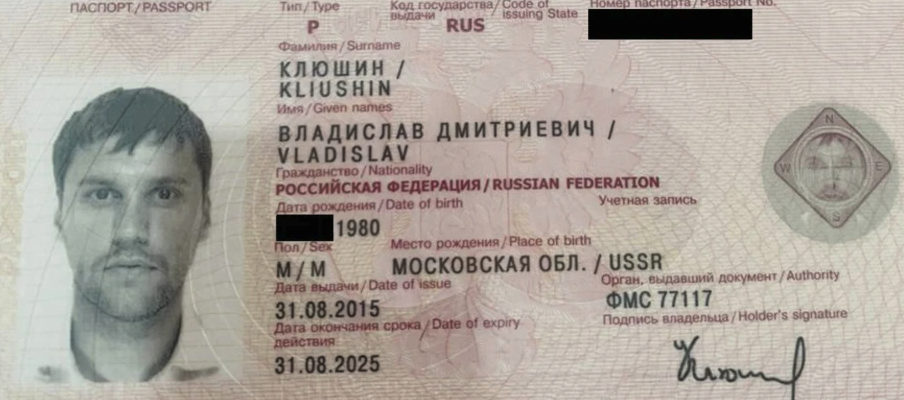U.S. Trades Cybercriminals to Russia in Prisoner Swap
Twenty-four prisoners were freed today in an international prisoner swap between Russia and Western countries. Among the eight Russians repatriated were several convicted cybercriminals. In return, Russia has reportedly released 16 prisoners, including Wall Street Journal reporter Evan Gershkovich and ex-U.S. Marine Paul Whelan.
Among the more notable Russian hackers released in the prisoner swap is Roman Seleznev, 40, who was sentenced in 2017 to 27 years in prison for racketeering convictions tied to a lengthy career in stealing and selling payment card data. Seleznev earned this then-record sentence by operating some of the underground’s most bustling marketplaces for stolen card data.

Roman Seleznev, pictured with bundles of cash. Image: US DOJ.
Once known by the hacker handles “Track2,” “Bulba” and “nCux,” Seleznev is the son of Valery Seleznev, a prominent member of the Russian parliament who is considered an ally of Vladimir Putin. U.S. prosecutors showed that for years Seleznev stayed a step ahead of the law by tapping into contacts at the Russian FSB, the successor agency to the Soviet KGB, and by periodically changing hacker handles.
But in 2014 Seleznev was captured by U.S. Secret Service agents, who had zeroed in on Seleznev’s posh vacation spot in The Maldives. At the time, the South Asian island country was a popular destination for Eastern Europe-based cybercriminals, who viewed it as beyond the reach of U.S. law enforcement.
In addition to receiving a record prison sentence, Seleznev was ordered to pay more than $50 million in restitution to his victims. That loss amount equaled the total losses inflicted by Seleznev’s various carding stores, and other thefts attributed to members of the hacking forum carder[.]su, a bustling cybercrime community of which Seleznev was a leading organizer.
Also released in the prisoner swap was Vladislav Klyushin, a 42-year-old Muscovite sentenced in September 2023 to nine years in prison for what U.S. prosecutors called a “$93 million hack-to-trade conspiracy.” Klyushin and his crew hacked into companies and used information stolen in those intrusions to make illegal stock trades.
Klyushin likewise was arrested while vacationing abroad: The Associated Press reported that Klyushin was captured in Switzerland after arriving on a private jet, and just before he and his party were about to board a helicopter to whisk them to a nearby ski resort.

A passport photo of Klyushin. Image: USDOJ.
Klyushin is the owner of M-13, a Russian technology company that contracts with the Russian government. According to prosecutors, M-13 offered penetration testing and “advanced persistent threat (APT) emulation.” As part of his guilty plea, Klyushin was also ordered to forfeit $34 million, and to pay restitution in an amount that was to be determined.
The U.S. government says four of Klyushin’s alleged co-conspirators remain at large, including Ivan Ermakov, who was among 12 Russians charged in 2018 with hacking into key Democratic Party email accounts.
Vladimir Dunaev, 40, was one of the masterminds behind the Trickbot trojan, a crimeware-as-a-service platform that for many years was used by Russian cybercrime groups to install ransomware and siphon data from victims. Duanev was sentenced in January 2024 to five years and four months in prison.
The fifth convicted Russian sent back home this week is Maxim Marchenko, 52, who pleaded guilty in February 2024 to illicitly procuring large quantities of U.S.-made microelectronics on behalf of Russian clients in support of the war on Ukraine.
Marchenko admitted setting up a number of shell companies based in Hong Kong that were used to acquire the technology products that have military-grade applications, such as rifle scopes, night vision goggles and thermal optics.
Among the Americans freed by Russia were Wall Street Journal reporter Evan Gershkovich, 32, who has spent the last 16 months in a Russian prison on spying charges. Also released was Alsu Kurmasheva, 47, a Russian American editor for Radio Free Europe/Radio Liberty who was arrested last year; and Paul Whelan, 54, a former U.S. Marine arrested in 2018 and accused of spying.
The New York Times reports several others freed by Russia were German nationals, including German Moyzhes, a lawyer who was helping Russians obtain residence permits in Germany and other E.U. countries. The Times says Slovenia, Norway and Poland released four people accused of being Russian spies.
Reuters reports that Germany released Vadim Krasikov, an FSB colonel serving a life sentence there for murdering an exiled Chechen-Georgian dissident in a Berlin park.
Update, 8:47 p.m. ET:An earlier version of this story incorrectly reported that one of the Russian hackers released was the BTC-e co-founder Alexander Vinnik. KrebsOnSecurity was unable to confirm his release. The above story has been edited to reflect that change.
Powered by WPeMatico



